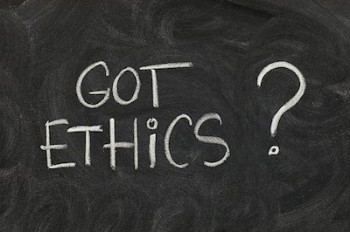Theatre’s Code Of Ethics

Written by American actress Kathleen Freeman (who tragically died of lung cancer in 2001, while appearing on Broadway as Jeanette in The Full Monty), this ‘Code’ was found among her personal possessions after her death. The Circle Theatre which 24-year-old Freeman established in Los Angeles in 1945, made every member of it’s company sign the document, stressing that the code not only applied actors, but at all members of the theatre community.
“I understand that membership in the Circle Theatre entitles me to the privilege of working, when I am so assigned, in any of the phases of a production, including: props, lights, sound, construction, house management, box office, publicity and stage managing-as well as acting. I realize it is possible I may not be cast in a part for many months, but I will not allow this to dampen my enthusiasm or desire to work, since I realize without my willingness to do all other phases of theatre work, there would be no theatre for me to act in.”
After reading all 17 items in the 1945 Theatre Worker’s Code Of Ethics, I found several very pertinent to the current theatrical climate.
Take, for example, number one: I shall never miss a performance.
Not surprising that this is the first point. A colleague of mine who, in over 500 performances of CATS, despite being ill or injured on various occasions, was stalwart and strong, absolutely refusing to take a show off. On another show, a colleague performed 122 shows in a row in a hugely demanding role, despite the intense vocal demands (and the cast falling like flies around him). And many others who, despite injury, pushed through years of shows because it is expected that unless you are dying (or dead, some people say), you just don’t “go off”. Young performers, often in their first production proudly boast “I will never take a show off” and everyone I know will push themselves to the absolute limit before calling in sick, especially in a show which runs for less than a few months. *see footnote
Now, the $64 000 question: Do we have this mentality because of the unspoken code of ethics? Or is the code of ethics a reflection of the psyche of performers? Were performers pre-1945 irked by the idea of missing a show? Is it our egos which refuse to let us take a show off? Are we letting the team down and will we be considered weak if we do?
I have a feeling that it’s combination of all of the above. The fact that we performers love the stage and love our jobs means that we are loathed to take time off. Be it because we dislike seeing someone else play ‘our role’, because we can’t bear to be away from the hub of activity in the theatre or because we live by the age-old ideology which states that come rain, come shine, come snow, come sleet: the show must go on.
Interestingly, even though Kathleen Freeman’s document is over 55 years old, I find it still very relevant. “I shall never miss an entrance”, ” I shall forego the gratification of my ego for the demands of the play”, “I shall not spread rumor or gossip which is malicious and tends to reflect discredit on my show” and “I shall never lose my enthusiasm for theatre because of disappointments” – all of these statements sound reasonable and familiar to me. Are they just common sense, or have I picked up these ideas from other actors over the years?
Personally, I am in complete agreeance with practically every point in the code, and to be completely honest, I am silently reprimanding myself for not following some of them on occasion. While these ‘rules’ seem like common sense they are generally unspoken, and sometimes, when perspective is lost, forgotten. These attitudes are never explicitly taught at drama school. They are never spelled out when you step into a rehearsal room.
Whether we learn this kind of ‘self-discipline’ through our art, or we learn our art through this self-discipline, I’m not sure. But I’m sure glad someone wrote it down. What do you think?
“The code is not a superstition, nor a dogma, nor a ritual which is enforced by tribunals; it is an attitude toward your vocation, your fellow workers, your audiences and yourself. It is a kind of self-discipline which does not rob you of your invaluable individualism.”
1. I shall never miss a performance. **
2. I shall play every performance with energy, enthusiasm and to the best of my ability regardless of size of audience, personal illness, bad weather, accident, or even death in my family.
3. I shall forego all social activities which interfere with rehearsals or any other scheduled work at the theatre, and I shall always be on time.
4. I shall never make a curtain late by my failure to be ready on time.
5. I shall never miss an entrance.
6. I shall never leave the theatre building or the stage area until I have completed my performance, unless I am specifically excused by the stage manager; curtain calls are a part of the show.
7. I shall not let the comments of friends, relatives or critics change any phase of my work without proper consultation; I shall not change lines, business, lights, properties, settings or costumes or any phase of the production without consultation with and permission of my director or producer or their agents, and I shall inform all people concerned.
8. I shall forego the gratification of my ego for the demands of the play.
9. I shall remember my business is to create illusion; therefore, I shall not break the illusion by appearing in costume and makeup off-stage or outside the theatre.
10. I shall accept my director’s and producer’s advice and counsel in the spirit in which it is given, for they can see the production as a whole and my work from the front.
11. I shall never “put on an act” while viewing other artists’ work as a member of an audience, nor shall I make caustic criticism from jealousy or for the sake of being smart.
12. I shall respect the play and the playwright and, remembering that “a work of art is not a work of art until it is finished,” I shall not condemn a play while it is in rehearsal.
13. I shall not spread rumor or gossip which is malicious and tends to reflect discredit on my show, the theatre, or any personnel connected with them-either to people inside or outside the group.
14. Since I respect the theatre in which I work, I shall do my best to keep it looking clean, orderly and attractive regardless of whether I am specifically assigned to such work or not.
15. I shall handle stage properties and costumes with care for I know they are part of the tools of my trade and are a vital part of the physical production.
16. I shall follow rules of courtesy, deportment and common decency applicable in all walks of life (and especially in a business in close contact with the public) when I am in the theatre, and I shall observe the rules and regulations of any specific theatre where I work.
17. I shall never lose my enthusiasm for theatre because of disappointments.
** While I admire this, and (and am guilty of it myself) – I must admit I do believe in prevention. If you are sick and a day’s rest will nip the bug in the bud, best take a day (lest you infect the entire company) and bounce back. Otherwise an illness can draw on for weeks. Of course, there are some situations in which ‘soldiering on’ is physically impossible (a broken foot, or swine flu quarantine – both of which I have witnessed in shows I have worked on), but for the most part, performers HATE taking a show off. It is also worth noting here, that this is the sole reason for swings and understudies – so that when you do need a show off, everything runs smoothly.


Erin, this is brilliant.